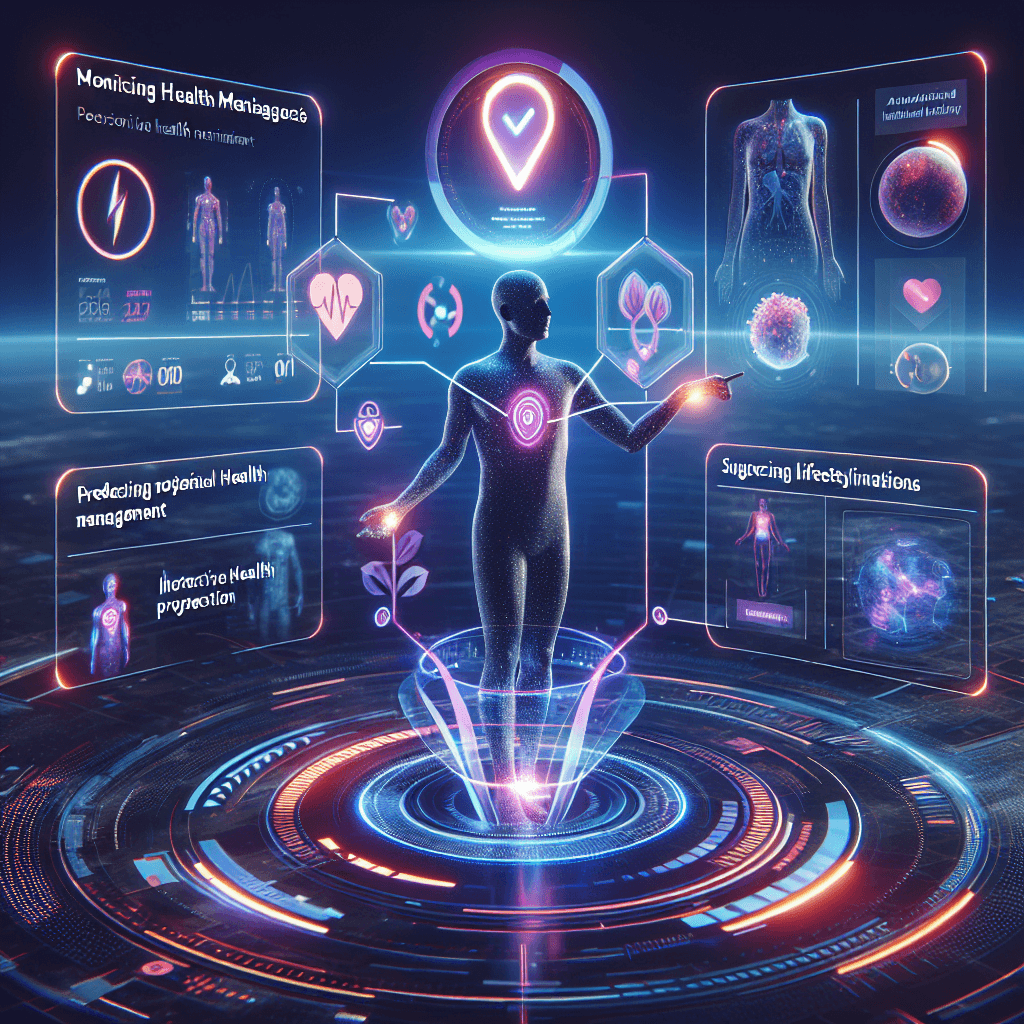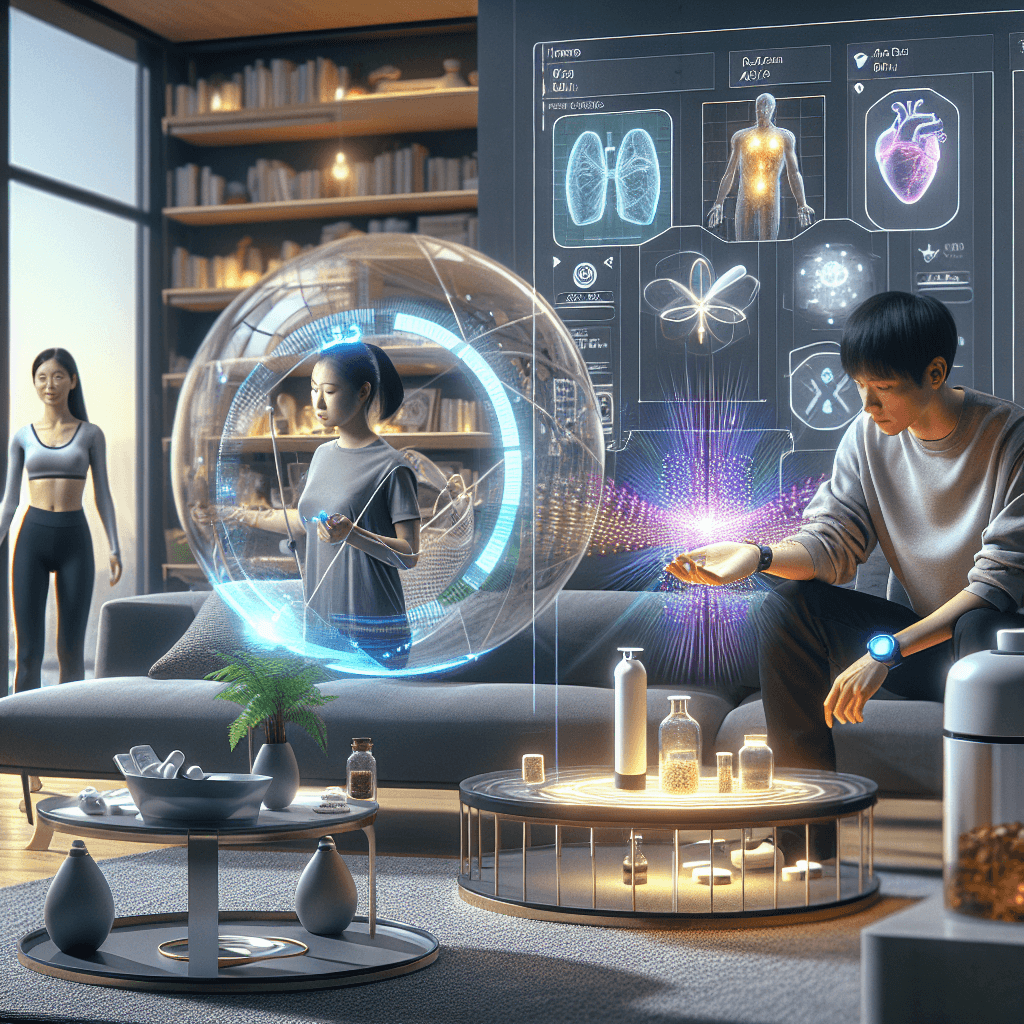Artificial intelligence (AI) is revolutionizing personal health management by providing individuals with advanced tools and capabilities to take charge of their well-being. Through AI-powered applications and devices, users can track their physical activities, monitor vital signs, and analyze their sleep patterns. Furthermore, AI algorithms can offer personalized suggestions for diet, exercise, and overall health improvements based on an individual’s unique data. This groundbreaking technology empowers individuals to make informed decisions about their health and proactively address potential concerns, ultimately leading to a healthier and more fulfilling life.
Table of Contents
Understanding Artificial Intelligence
Artificial Intelligence, often referred to as AI, is a branch of computer science that focuses on creating intelligent machines capable of performing tasks that typically require human intelligence. AI systems can analyze vast amounts of data, learn from experience, and make intelligent decisions without explicit programming. The goal of AI is to mimic human cognitive abilities, such as problem-solving, reasoning, and decision-making, to solve complex problems and improve efficiency in various industries, including healthcare.
Definition of Artificial Intelligence
Artificial Intelligence can be defined as the simulation of human intelligence in machines that are programmed to think and learn like humans. It involves the development of computer systems capable of performing tasks that would typically require human intelligence, such as natural language processing, speech recognition, image recognition, and decision-making. AI systems can analyze vast amounts of data, detect patterns, and make predictions or recommendations based on the data analysis.
Types of Artificial Intelligence
There are various types of Artificial Intelligence, each with its own unique capabilities and applications:
- Narrow AI (Weak AI): Narrow AI systems are designed to perform a specific task or a set of tasks. These AI systems are highly specialized and excel in their specific domain. Examples of narrow AI include virtual assistants like Siri or Alexa, autonomous vehicles, and recommendation systems used by online platforms.
- General AI (Strong AI): General AI systems possess the ability to understand, learn, and apply knowledge across a wide range of tasks. These AI systems can perform any intellectual task that a human being can do. General AI is still in the realm of science fiction and is yet to be achieved.
- Machine Learning (ML): Machine Learning is a subset of AI that focuses on enabling machines to learn from and improve with experience without being explicitly programmed. ML algorithms can analyze large datasets, detect patterns, and make predictions or decisions based on the analyzed data. ML is widely used in various applications, including data analysis, prediction modeling, and natural language processing.
- Deep Learning: Deep Learning is a further subfield of Machine Learning that utilizes neural networks with multiple layers to process and analyze complex data. Deep Learning algorithms can learn representations of data with multiple levels of abstraction, allowing machines to perform tasks such as image recognition and natural language understanding.
AI in Healthcare
Artificial Intelligence has the potential to revolutionize the healthcare industry by improving diagnostics, treatment options, disease prevention, and health monitoring. AI-powered technologies can analyze massive amounts of medical data, detect patterns and anomalies, and provide valuable insights to healthcare professionals. By leveraging AI, healthcare systems can achieve faster and more accurate diagnoses, personalized treatment plans, and enhanced patient care.
Benefits of Artificial Intelligence in Personal Health Management
The integration of Artificial Intelligence in personal health management offers numerous benefits for individuals looking to improve their overall well-being. These benefits include:
Improved Diagnostics
One of the key advantages of AI in personal health management is improved diagnostics. AI algorithms can analyze medical images, such as X-rays and MRI scans, with exceptional precision, detecting potential abnormalities or diseases at an early stage. This enables healthcare professionals to make more accurate diagnoses and develop effective treatment plans, ultimately improving patient outcomes.
Advanced Treatment Options
AI can also contribute to the development of advanced treatment options. By leveraging machine learning algorithms, researchers and clinicians can analyze large datasets of patient records, genetic information, and medical literature to identify patterns and correlations. This enables the identification of more effective treatment approaches and the customization of therapies to individual patients, improving treatment success rates.
Enhanced Disease Prevention
Another benefit of AI in personal health management is enhanced disease prevention. By analyzing vast amounts of health data, including lifestyle factors, genetic information, and medical histories, AI systems can identify individuals at risk of developing certain diseases. This enables proactive interventions, such as lifestyle modifications or early screenings, to prevent or delay the onset of diseases, leading to improved health outcomes and reduced healthcare costs.
Efficient Health Monitoring
AI-powered technologies can also enable efficient health monitoring. By leveraging Wearable devices and IoT (Internet of Things) sensors, AI systems can continuously collect and analyze real-time health data, such as heart rate, blood pressure, or sleep patterns. This allows individuals to proactively manage their health, receive timely alerts and recommendations, and seek necessary medical interventions when needed.

Applications of Artificial Intelligence in Personal Health Management
The applications of Artificial Intelligence in personal health management are diverse and continuously evolving. Some key applications include:
Virtual Health Assistants
Virtual health assistants, powered by AI, enable individuals to access personalized healthcare information, guidance, and support from the comfort of their homes. These virtual assistants can provide basic medical advice, remind patients to take medication, and offer lifestyle recommendations based on individual health data. Virtual health assistants improve accessibility to healthcare, reduce the burden on healthcare professionals, and empower individuals to take control of their health.
AI-powered Medical Devices
AI-powered medical devices are devices that utilize AI algorithms to enhance their functionality and performance. These devices range from wearable health trackers to sophisticated diagnostic tools. For example, AI-powered electrocardiogram (ECG) devices can analyze ECG readings in real-time, detecting abnormalities or signs of heart disease. AI-powered medical devices enable individuals to monitor their health, receive early warnings, and improve overall wellness.
Data Analysis and Predictive Modeling
AI enables advanced data analysis and predictive modeling in personal health management. By analyzing large datasets of patient records, medical literature, and real-time health data, AI systems can identify patterns, correlations, and predict health outcomes. This enables healthcare professionals to make informed decisions, develop targeted interventions, and optimize treatment plans for individual patients.
Precision Medicine
AI facilitates the implementation of precision medicine in personal health management. Precision medicine aims to provide targeted treatment plans based on an individual’s unique genetic makeup, lifestyle factors, and medical history. AI algorithms can analyze genetic data, medical records, and lifestyle information to identify personalized treatment options and predict treatment response. Precision medicine allows for more effective and customized therapies, improving patient outcomes.
AI Tools Empowering Patients
Artificial Intelligence tools play a crucial role in empowering individuals to take an active role in managing their own health. Some key AI tools include:
Digital Health Apps
Digital health apps are mobile applications that leverage AI to provide personalized health information, track health metrics, and offer lifestyle recommendations. These apps can monitor exercise, nutrition, sleep patterns, and provide real-time feedback to individuals. By using AI algorithms, digital health apps can generate meaningful insights from health data, helping individuals make informed decisions about their well-being.
Personal Health Assistants
Personal health assistants are AI-powered systems that provide personalized healthcare guidance and support. These assistants can interact with individuals through voice or text interfaces and offer information about various health topics, medication management, and lifestyle recommendations. Personal health assistants can act as a valuable resource, empowering individuals to make informed health-related decisions and adopt healthier behaviors.
Virtual Health Communities
Virtual health communities are online platforms or social networks that connect individuals with similar health conditions or goals. These communities leverage AI algorithms to match individuals with similar profiles, enabling peer-to-peer support, information sharing, and community engagement. Virtual health communities foster collaboration, provide emotional support, and offer a sense of belonging for individuals dealing with specific health challenges.
Telehealth Services
Telehealth services, powered by AI-driven technologies, enable individuals to access healthcare services remotely. Through video consultations or chatbot interactions, individuals can connect with healthcare professionals, discuss symptoms, receive medical advice, and obtain prescriptions for non-emergency conditions. Telehealth services improve accessibility to healthcare, particularly for individuals in remote areas or with limited mobility.

Challenges and Ethical Considerations
The integration of Artificial Intelligence in personal health management also poses certain challenges and ethical considerations that need to be addressed. Some of these challenges include:
Privacy and Security
The use of AI technologies in personal health management involves the collection and analysis of large amounts of sensitive health data. Ensuring the privacy and security of this data is of utmost importance to protect individuals’ confidentiality and prevent unauthorized access or data breaches. Robust data encryption, authentication measures, and comprehensive security protocols should be implemented to safeguard personal health information.
Data Bias and Accuracy
AI algorithms rely on large datasets to learn and make predictions. However, these datasets may contain inherent biases, leading to biased outcomes or recommendations. Bias in AI can disproportionately affect certain groups, potentially leading to healthcare disparities. It is crucial to address and mitigate biases in AI algorithms, ensure accurate and representative datasets, and regularly evaluate the performance and fairness of AI systems.
Trust and User Adoption
Adopting AI technologies in personal health management requires individuals to trust AI systems with their health-related information and decisions. Building trust in AI systems can be challenging, particularly if individuals are skeptical about the accuracy or impartiality of AI algorithms. Transparent communication, clear explanations of AI processes, and involving individuals in the decision-making process can help foster trust and facilitate user adoption of AI technologies.
Regulatory and Legal Issues
The rapid advancement of AI in healthcare poses regulatory and legal challenges. Establishing robust regulations and guidelines for the development, deployment, and use of AI technologies is essential to ensure patient safety, maintain ethical standards, and avoid potential misuse of AI. Regulatory frameworks should address issues such as data privacy, transparency, accountability, and liability to protect both individuals and healthcare professionals.
Future Implications and Possibilities
The integration of Artificial Intelligence in personal health management holds immense potential for the future of healthcare. Some of the future implications and possibilities include:
Personalized Virtual Healthcare
AI has the potential to enable personalized virtual healthcare experiences, where individuals can receive tailored medical advice, treatment plans, and monitoring from the comfort of their homes. Virtual doctor visits, AI-powered diagnosis, and remote patient monitoring can provide efficient and accessible healthcare services, particularly for individuals with limited mobility or in remote areas.
Real-time Monitoring and Intervention
AI technologies can enable real-time health monitoring and intervention, allowing individuals to manage their health proactively. Wearable devices and IoT sensors can continuously collect health data and provide timely alerts or recommendations for lifestyle modifications or medical interventions. Real-time monitoring can help individuals detect potential health issues early, leading to prompt interventions and better health outcomes.
AI in Drug Discovery and Clinical Trials
AI has the potential to revolutionize drug discovery and clinical trials. By analyzing vast amounts of medical literature, genetic data, and patient records, AI algorithms can identify new drug targets, predict drug efficacy, and optimize clinical trial design. AI can accelerate the development of novel therapies, reduce drug development costs, and improve the success rate of clinical trials.
AI-Augmented Medical Education
AI technologies can enhance medical education by providing interactive and personalized learning experiences. AI-powered virtual simulators and virtual reality applications can enable medical students to practice complex procedures, enhance critical thinking skills, and gain hands-on experience in a safe environment. AI can also support continuous medical education by providing real-time access to the latest research findings and medical literature.

Success Stories of AI in Personal Health Management
Artificial Intelligence has already demonstrated its potential to revolutionize personal health management in various areas. Some success stories include:
Improved Cancer Detection
AI algorithms have shown promising results in improving cancer detection. For example, deep learning algorithms can analyze medical images, such as mammograms or CT scans, to identify subtle signs of cancerous growths. AI-based cancer detection systems can enhance the accuracy of early cancer detection, reducing false negatives and improving patient survival rates.
Early Diagnosis of Alzheimer’s
Early diagnosis of Alzheimer’s disease can significantly improve patient outcomes and quality of life. AI algorithms can analyze speech patterns, cognitive assessments, and brain imaging data to identify early signs of Alzheimer’s disease. AI-based diagnostic tools enable early detection, providing individuals with the opportunity to access timely interventions and treatments, optimizing their quality of life.
Enhanced Diabetes Management
Diabetes management can be challenging, requiring individuals to monitor their blood sugar levels, dietary intake, and medication adherence. AI-powered systems can analyze real-time health data, such as continuous glucose monitoring, and provide personalized recommendations for diabetes management. AI-based diabetes management tools can help individuals achieve better glycemic control and prevent complications.
Personalized Mental Health Support
AI technologies can contribute to personalized mental health support. AI-powered chatbots or virtual assistants can engage in conversations with individuals, providing empathetic support, and offering resources for mental health management. Personalized mental health support systems can improve access to mental healthcare, reduce stigma, and provide individuals with tools for self-care.
Integration of AI and Big Data Analytics
The integration of AI and big data analytics has the potential to drive significant advancements in healthcare. Some key aspects of this integration include:
Harnessing Big Data in Healthcare
Big data refers to large and complex datasets that cannot be processed using traditional data processing methods. AI algorithms can analyze big data to identify patterns, correlations, and insights that can inform healthcare decisions. By harnessing big data, healthcare professionals can gain a deeper understanding of diseases, treatment outcomes, and population health trends, ultimately improving patient care and health outcomes.
Machine Learning for Data Analysis
Machine Learning algorithms are particularly effective in analyzing big data to extract meaningful information. These algorithms can detect hidden patterns, identify anomalies, and make predictions based on the analyzed data. Machine Learning can enable more accurate diagnosis, prediction modeling, and treatment optimization by uncovering valuable insights from large and diverse healthcare datasets.
Predictive Analytics for Healthcare Decisions
Predictive analytics utilizes AI algorithms to predict future health outcomes based on historical data. By analyzing large volumes of patient records, sensor data, or genomic information, predictive analytics can identify individuals at risk of specific events, such as hospital readmissions or disease progression. This enables healthcare professionals to intervene proactively, implement preventive measures, and improve patient outcomes.
Real-time Data Synchronization
The integration of AI and big data analytics enables real-time data synchronization and analysis. By continuously collecting and analyzing real-time health data from wearable devices, electronic health records, or IoT sensors, AI systems can provide timely recommendations, alerts, or interventions. Real-time data synchronization ensures that healthcare decisions are based on the most up-to-date information, optimizing patient care.

Collaboration between AI and Healthcare Professionals
The successful integration of AI in personal health management requires collaboration between AI technologies and healthcare professionals. Some aspects of this collaboration include:
AI as an Assistant to Physicians
AI can serve as an assistant to physicians, supporting them in various tasks. AI algorithms can analyze patient data, medical literature, and treatment guidelines, providing physicians with evidence-based recommendations for diagnosis, treatment planning, or drug interactions. AI-enabled decision support systems can enhance the efficiency and accuracy of healthcare professionals, enabling better patient outcomes.
AI-powered Decision Support Systems
AI-powered decision support systems can aid healthcare professionals in making informed decisions. These systems can analyze medical data, patient history, and treatment options to provide recommendations for personalized treatment plans. AI algorithms can also consider patient preferences, cost considerations, and potential risks, facilitating shared decision-making between patients and healthcare professionals.
Augmented Collaboration in Diagnoses
AI technologies can enhance collaboration between healthcare professionals in diagnoses. For example, AI algorithms can analyze medical images and highlight potential abnormalities or features for further investigation. By enabling collaborative diagnoses, AI can leverage the collective expertise and knowledge of multiple healthcare professionals, leading to more accurate and comprehensive diagnoses.
Automation of Routine Tasks
AI can automate routine tasks in healthcare, freeing up healthcare professionals’ time and enabling them to focus on more complex or critical tasks. AI-powered systems can automate administrative tasks, such as appointment scheduling or medical record documentation. This automation allows healthcare professionals to spend more time on direct patient care, improving overall efficiency and patient satisfaction.
Conclusion
Artificial Intelligence is transforming personal health management by improving diagnostics, treatment options, disease prevention, and health monitoring. AI-powered technologies enable individuals to access personalized healthcare information and support, empowering them to take an active role in managing their health. Despite the benefits, challenges such as privacy, data bias, trust, and regulation need to be addressed to ensure the ethical and effective integration of AI in healthcare. The future implications of AI in personal health management are vast, with the potential for personalized virtual healthcare, real-time monitoring, and interventions, and advancements in drug discovery and medical education. By leveraging the power of AI and integrating it with big data analytics, healthcare professionals can gain valuable insights, make informed decisions, and improve patient care. Collaboration between AI technologies and healthcare professionals is vital to harness the full potential of AI in personal health management, enhancing patient outcomes and transforming healthcare delivery.


